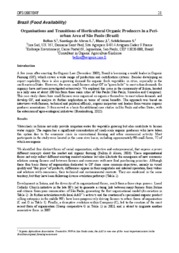Organisations and transitions of horticultural organic producers in a periurban area of São Paulo (Brazil).
Organisations and transitions of horticultural organic producers in a periurban area of São Paulo (Brazil).
Autoria: BELLON, S.; ABREU, L. S. de; BLANC, J.; SCHLICKMANN, S.
Resumo: A few years after enacting the Organic Law (December 2003), Brazil is becoming a world leader in Organic Farming (OF), which covers a wide range of production and certification systems. Besides developing an export capability, there is also a growing demand for organic fresh vegetables in cities, especially in the south-eastern States. However, the ways small farmers adopt OF in ?green belts? to meet urban demands for organics have not been investigated extensively. We explored this issue in the community of Ibiúna, located in a hilly area at about 100 km from three main cities of São Paulo (São Paulo, Sorocaba and Campinas). This case study shows how small farmers were organised or organise themselves to meet urban demands and develop OF, and analyse its further implication in terms of social benefits. The approach was based on interviews with farmers, technical and political officials, organic inspectors and leaders from various organic producer associations. It then served as a basis for additional case studies in São Paulo and other States, with the extension of agro-ecological initiatives (Brandenburg, 2002).
Ano de publicação: 2007
Tipo de publicação: Artigo em anais e proceedings
Unidade: Embrapa Meio Ambiente
Palavras-chave: Agricultura Orgânica, Brasil
Observações
1 - Por padrão são exibidas publicações dos últimos 20 anos. Para encontrar publicações mais antigas, configure o filtro ano de publicação, colocando o ano a partir do qual você deseja encontrar publicações. O filtro está na coluna da esquerda na busca acima.
2 - Para ler algumas publicações da Embrapa (apenas as que estão em formato ePub), é necessário ter, no celular ou computador, um desses softwares gratuitos. Sistemas Android: Google Play Livros; IOS: iBooks; Windows e Linux: software Calibre.
Acesse outras publicações
Acesse a Base de Dados da Pesquisa Agropecuária (BDPA) para consultar o acervo completo das bibliotecas da Embrapa.

